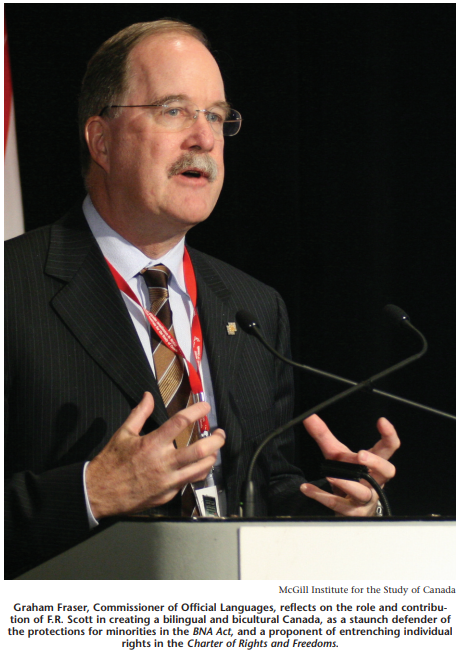
Frank Scott was, in the words of political scientist Allen Mills, “arguably Canada’s most accomplished all-round public intellectual” of the 20th century. Michael Oliver once observed that everyone knew a different Frank Scott. Indeed, previous lecturers have touched on Scott’s influence on Canadian social welfare policy, and his legacy in the areas of human rights, anti-fascism, poetry, free speech, party politics and constitutional law. This year is the 110th anniversary of his birth, and I would like to trace the development of Scott’s thinking about French Canada, and the impact he had on language rights and language legislation.
When he died, almost 25 years ago, he was worried that he had lost his fight for bilingualism. He had hoped that Quebec’s bilingualism would be a model for the rest of the country, and was furious about Quebec’s language laws. He feared they would provoke a backlash against French in the rest of Canada, and was angry about what he felt were the myths being propagated about Quebec’s English community.
It is true that his vision of a bilingual Quebec inspiring a bilingual Canada did not come to pass. Over the years, Scott moved from being a defender and explainer of French-language rights to a sometimes bitter defender of the English-speaking minority in Quebec. But with a little distance, it is possible to see now how important his influence was in fighting for a Charter of Rights and in defining language as a human right. He saw the Constitution as the vessel that contained the philosophical rules and principles that governed relations between individuals and cultural groups, and their relations with the state. Those relationships are as critical now as they have ever been.
Scott never forgot his childhood in Quebec City; one of his early memories also included the conscription riot in Quebec City during the First World War — one that haunted him years later.
In 1928, he started teaching law at McGill — and, as he put it, “the next year the whole North American economy collapsed. One could not live through the Great Depression and remain politically unaffected.” During the grim years that followed, he became politically active as one of the authors of the Regina Manifesto that created the CCF, precursor to the NDP. At the same time, as he became engaged in the Montreal literary scene, he began to reach out to French-speaking writers and artists.
However, his relationship to French-speaking Quebec was ambiguous. On the one hand, he was attracted by the language and culture. But while drawn to rebels and reformers, poets and intellectuals, and sympathetic to the economic discrimination suffered by French-speaking Canadians, Scott was repelled by the dominant ideology of clerical conservatism and cut off from much of what was going on in literary Quebec in the 1930s and 1940s.
Politically, Scott saw French Canadians as passive victims, prey to manipulation by what he called “the provincial trinity: the Liberal Party machine, the Roman Church and St. James Street…the theo-pluto-bureaucracy.”
That analysis, formed during the Depression, profoundly shaped his views: that weak provincial governments allowed corporations free rein; that French-Canadian nationalism was at risk of becoming proto-fascist through manipulation of “the French masses”; that a strong federal government was necessary to protect minority and social rights from corporate exploitation and the resentment of the oppressed majority.
In the same period it is also possible to see the beginning of Scott’s exploration of the connection between individual rights and collective rights in Canada — and his ever-clearer sense of the role of language rights in that relationship.
In 1947, he began a short article for Queen’s Quarterly by taking issue with a British Columbia letter-writer who had suggested to a weekly publication that, while French was the mother tongue of 3 million people in Quebec, Canada was not a bilingual country: “English is the official language of the rest of Canada, and of 130 million people in the United States.”
It was an argument that Scott, two decades before the Royal Commission on Bilingualism and Biculturalism, had no patience for.
Expressing surprise that it needed to be clarified, 80 years after the British North America Act, Scott pointed out that section 133 of the Act meant that every piece of federal legislation is published in the two official languages, and that each version has the force of law.
“Thus, the actions, rights and duties of Canadians, in British Columbia as elsewhere, are just as much governed by the French version of the federal law as they are by the English,” he wrote.
This was a significant part of Scott’s life work: trying to balance these two sometimes conflicting principles of individual civil liberties and minority rights and establish a dialogue between those who stressed one rather than the other. The Canadian Charter of Rights and Freedoms enshrined in the Constitution Act 1982, 35 years later, represents the blending that Scott called for in 1947 — even though Scott himself was unhappy with some of the compromises contained in the Charter.
In 1963, Prime Minister Lester Pearson asked Scott to be a member of the Royal Commission on Bilingualism and Biculturalism, which would be co-chaired by André Laurendeau and Davidson Dunton. It was there that Scott’s views on language and bilingualism would be challenged, sharpened, and, in some cases, rejected.
While he had a national reputation, Scott was named as the only representative of the English minority in Quebec. It was a key to his identity in many ways: he knew all the Quebec members of the commission and, with the exception of Dunton, none of the members from the rest of Canada.
Laurendeau and Dunton were cochairs, but the real debate, intellectual and emotional, linguistic and national, was between Laurendeau and Scott. Both men had subtle minds, political idealism, personal charisma and a poet’s sensibility.
While drawn to rebels and reformers, poets and intellectuals, and sympathetic to the economic discrimination suffered by French-speaking Canadians, Scott was repelled by the dominant ideology of clerical conservatism and cut off from much of what was going on in literary Quebec in the 1930s and 1940s.
Scott’s view was that, although French Canada could legitimately be considered a nation, Quebec was — or should be — a bilingual society. (After a private meeting of the commissioners in 1964, he wrote, “In further conversation about the two nation theory, I said ‘Quebec is a unilingual, unicultural society, while English Canada is a unilingual, multicultural society.’ Laurendeau agreed.”)
Scott did not lose his quick wit during some of the stormy public hearings. At a meeting in Sherbrooke, a young man said that he cared nothing about the French-speaking minorities outside Quebec; that the only minority that mattered was the English-speaking minority in Quebec, and it should leave as soon as possible. “J’y suis, j’y reste” (I’m here, I’m staying), quipped Scott. It would famously become the motto for the No forces in the 1980 referendum.
Over the years, Scott moved from optimism to becoming increasingly depressed and pessimistic. On August 11, 1965, he wrote a memo for the commission in which he began on an upbeat note, summarizing Canada’s advantages as a prosperous developed democracy with two international working languages.
He rejected the idea that Quebec alone should assume responsibility for French-Canadian culture, calling it “historically false and morally reprehensible.” His view — “which I trust is the view of this Commission” — was that every government in Canada had the function of defending both cultures. Quebec, he argued, remains the centre of French culture but would reject “unilingualism and any form of forcible francisation,” setting the model for other provinces to adopt more bilingualism.
As always, Scott saw the federal government as the crucial level for progressive change. But he was increasingly concerned that Quebec was moving away from bilingualism toward unilingualism. “The Quebec government does not have to introduce, but to preserve, biculturalism; it would be tragic, and comic, if it disappeared in Quebec just as it was appearing elsewhere.”
He had difficulty resolving the paradox of official bilingualism: the institutions of the state becoming bilingual so that individuals can remain unilingual. It was a paradox spelled out by one of the commission’s researchers, William Mackey, who explained that bilingual countries were not created to promote bilingualism but to guarantee the maintenance and use of two or more languages.
At first, Scott was a bit taken aback at the idea that a commission appointed to promote bilingualism could end up favouring the promotion of unilingualism. “Gradually it dawned on me, and I think on the others, that what Mackey meant was that unless there was a strong degree of unilingualism in the bilingual country for each language, one would eventually dominate and assimilate the other,” he wrote. “Promoting unilingualism, and having two essentially unilingual groups, did not exclude the possibility that individual members of each group might be able to speak the other language as well.”
That paradox, and Scott’s description of it, has had a substantial impact on my own thinking about language in Canada. There has always been a facile criticism about language policy in Canada that has assumed that its purpose was to make everyone bilingual: everyone is not bilingual, the argument goes, ergo the policy is a failure. But if one defines the policy as one that is intended to make governments able to serve citizens in the language of their choice so that citizens do not have to be bilingual, the policy is both more pragmatic and more achievable. It is also a policy that both assures the individual’s right to deal with the federal government in the official language that individual chooses — and one that protects, promotes and takes positive measures for minority-language communities. It is a policy that protects both individual rights and group rights.
In August of 1967, in a comment objecting to two paragraphs in a draft of the first volume of the report, Scott explicitly laid out his view of language as a human right. It is an eloquent defence of language as a right, and of the English-speaking minority.
“The right to one’s language in all personal and private relations is a human right. It is as inherent in man as his freedom of speech or of conscience,” he wrote. “It starts with mother and child; it continues into wider social groupings. It is not granted by the State or by Constitutions. Laws may protect it and may prescribe conditions under which it may be reasonably exercised, particularly in dealing with state authorities.”
He went on to dismiss the idea of establishing more than two official languages, to stress the importance of the English language in Quebec, the English-speaking community — then 800,000 strong and the largest language minority in Canada — as a model for French-English relations, and to underline the importance of the existing 1867 Constitution.
“Section 133 of the BNA Act is not an obstacle, but a great help, and it makes for an equal partnership within Quebec and is based on human rights which even the independence of Quebec would not call into question.”
The final note that Scott struck was a pessimistic one: a 10-page legalsized document poignantly entitled “The End of the Affair”: undated — but presumably, on the basis of the internal evidence, in 1970, before the October Crisis.
“It is astonishing and also frightening for me to watch Quebec abandon so many of its ancient virtues and values in order to rush into the North-American capitalist system with arms open for the embrace,” he wrote. “The values of that system I learned to despise and reject in the 1930s. I had hoped that the Catholic tradition with its greater emphasis on social obligations would somehow mitigate the prevailing Protestant ethic of free enterprise.”
It was a poignant sign of age that at 70, he nostalgically saw “virtues and values” where at 33 he had denounced the Church for interpreting the Depression “as a sort of punishment from God upon greedy individuals.”
A further breach occurred with the introduction of Bill 22 by the Bourassa government in 1974, which declared French to be the official language of Quebec. The bill galvanized Scott into defence of the English minority.
Scott went through the bill clause by clause, declaring them to be “misleading,” “clearly unconstitutional,” “discriminatory,” “undemocratic,” and “coercive and oppressive.” In one marginal note he wrote, “Building contracts for McGill must be in French” and in another, “Minority has no right to its language from Hydro!”
The Parti Québécois was elected in 1976 and in 1977 introduced Bill 101, which became the even more stringent Charter of the French Language.
Scott’s worst fears of Quebec unilingualism had come to pass. His friends remarked on his bitterness. “You know for years I’ve spoken French whenever I’ve had the opportunity,” he said to Eugene Forsey during a discussion on Bill 22. “Now I’m damned if I’ll speak French.”
He became equally bitter that Trudeau, despite strong urging from his former mentor, did not use the federal government’s power of disallowance to strike down the Quebec language legislation.
Four years later, when the Constitution was patriated with a Charter of Rights and Freedoms, Scott felt a mixture of pride and disappointment; the night before, at a reception for Rhodes Scholars, old and new, Pierre Trudeau had literally wept with joy when he introduced Scott to the Queen, saying, “Everything I learned about the Constitution I learned from this man.”
Scott was both deeply proud of the recognition, and bitter that Trudeau had not done more. He would retell the story often, adding with a rueful flourish, “He didn’t learn enough!” And he was angry — “browned off,” he said in a letter — that there were no English-Canadian names among the signatures on the Charter.
Two and a half years later, in January 1985, Scott died.
It is true that his vision for Quebec and Canada did not survive. Canada’s language regime is characterized by remarkable asymmetry, with Quebec being unilingual French, New Brunswick officially bilingual, the territory of Nunavut officially trilingual and other provinces having a wide range of minority-languages from substantial to almost non-existent. It is a regime built on a series of compromises, and Scott hated compromises, above all on questions that he saw as fundamental: minority-language rights, and the powers of the federal government.
However, almost 25 years after his death, it is also easier to see the magnitude of his achievements. His influence on Trudeau, while not as great as he had hoped, was huge, as it was on several generations of lawyers and legal scholars. His contribution to the Royal Commission on Bilingualism and Biculturalism was enormous. His thinking was an inspiration for the debates that led to the Charter of Rights and Freedoms. His clarity of thought defining language rights as human rights laid the groundwork for an edifice of jurisprudence on language. And his insistence on the rule of law presaged the critical role the courts have played in defining language rights. The ground-breaking Supreme Court decision on the secession of Quebec, with its definition of minority rights as one of the central elements of Canadian democracy, stands on the foundation that he helped build. As he so eloquently put it, “If human rights and harmonious relations between cultures are forms of the beautiful, then the state is a work of art that is never finished.”
Excerpted from the F.R. Scott Lecture at McGill University, November 18, 2009.
Photo: Shutterstock








